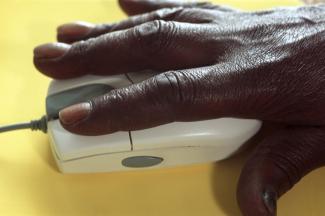Human rights
Clean conscience

Apple wants to be the first. This time the ambition is not to present the newest gadget, but to only use raw materials from conflict-free regions for the manufacturing of its smartphones, tablets and computers. Many resources which are needed for the production of IT hardware are found in conflict-torn countries like the Democratic Republic of the Congo, so buying the commodities often means funding warlords and thus fuelling civil strife. In the past, IT companies were heavily criticised for ignoring this truth.
Apple, however, now claims that it will only source Tantal, a mineral which is used in IT tools, from conflict-free places. Apple is also striving to use only metals from smelters which comply with the Conflict-Free Smelter Program (CFSP). This example may encourage other IT firms to do the same. The German business paper Handelsblatt expresses scepticism however: "Producing fair electronics is difficult, in smartphones alone up to 30 different metals are used."
The electronics industry is one of the fastest growing global industries with an expected yearly growth of seven percent from 2013 to 2015. Despite the modern and clean image the industry has, the resources the industry uses tend to be tainted. There are other issues on top of civil strife, including harsh working conditions in African mines and Asian manufacturing facilities.
The new non-governmental organisation (NGO) Electronics Watch (EW) attempts to monitor the global electronics industry in regard to labour conditions and human rights in the entire production cycle. "Company performance, including purchasing practices, needs to be brought in line with the corporate responsibility," the organisation states. EW is runninga factory-level monitoring programme as well as a reform programme which promotes responsible purchasing practices.
Fairphone from the Netherlands is another NGO which tries to make the supply chain of smartphone producers transparent and accountable. The German NGO Nager IT concentrates on one item only, the computer mouse. The word "Nager" means "rodent". Nager IT is one of the civil-society initiatives ENGAGEMENT GLOBAL supports in this field. The activists argue that a mouse is still a cheap item, even if all components are sourced in a socially and environmentally manner. Individual consumers can afford those fair devices, and that will make a difference in the lives of unskilled workers overseas and send a message to the industry. Fair enough.
Sheila Mysorekar








